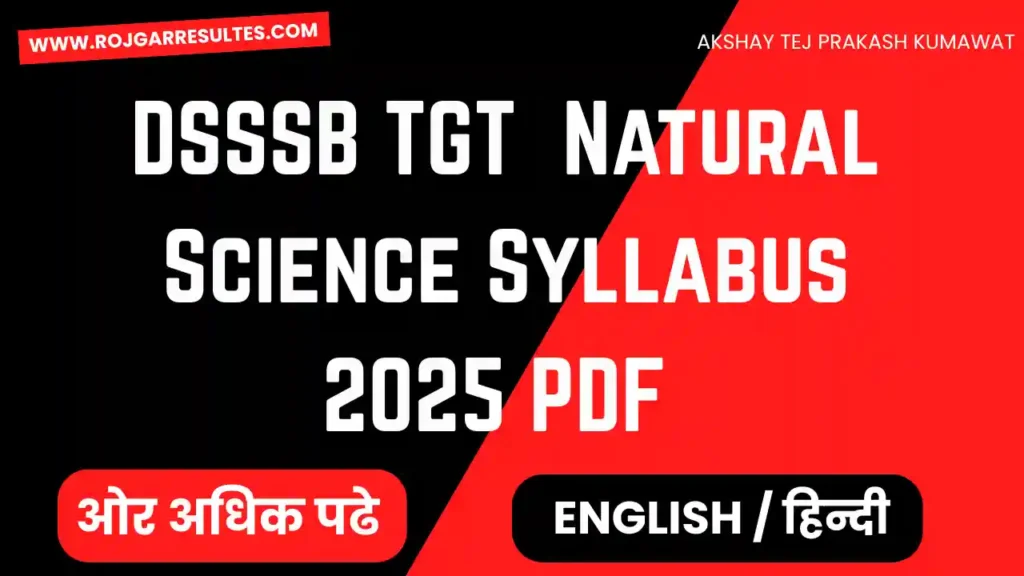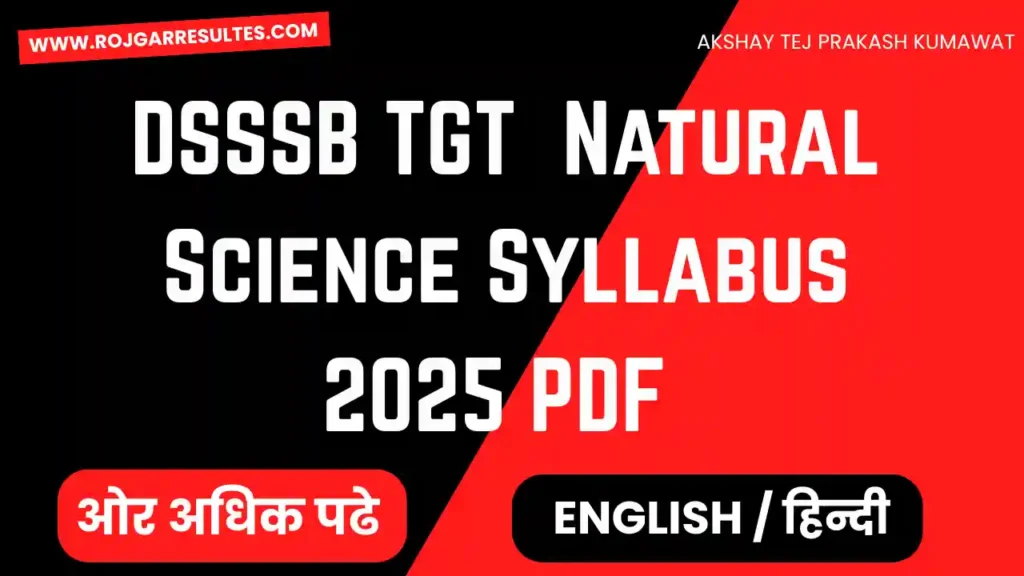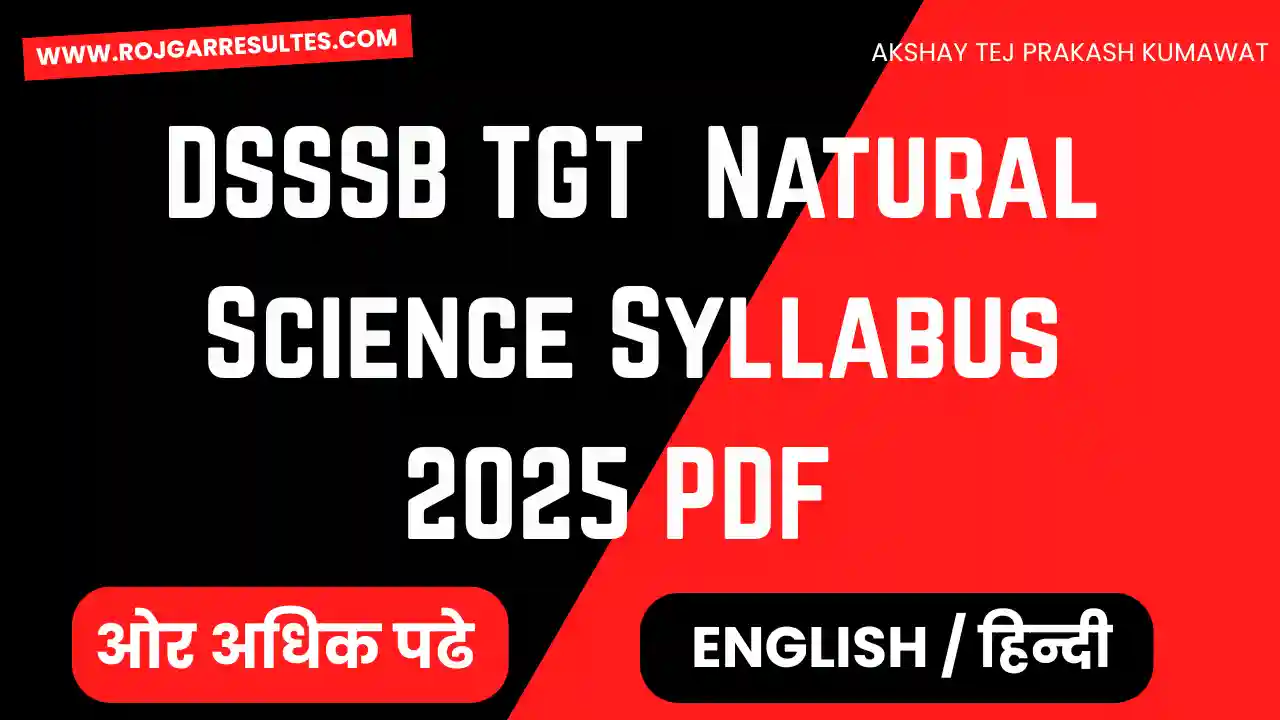DSSSB TGT Natural Science syllabus is designed to cover essential topics in physics, chemistry, biology, and environmental science. Candidates preparing for the exam must thoroughly understand the DSSSB TGT Natural Science syllabus to excel in all sections.
सभी अभ्यर्थियों को सूचित किया जाता है कि रिजल्ट, सिलेबस, आवेदन लिंक, एडमिट कार्ड व नोटिफिकेशन के सभी लिंक नीचे उपलब्ध हैं।
This syllabus includes electricity, magnetism, light, energy sources, motion, gravitation, matter, atomic structure, chemical reactions, and life processes.
Following the TGT Natural Science syllabus helps aspirants focus on important areas like reproduction, heredity, evolution, and environmental conservation. By systematically studying the TGT Natural Science syllabus, candidates can improve their preparation.
DSSSB TGT Natural Science syllabus Electricity & Magnetism
The syllabus covers fundamental concepts of electricity and magnetism. Candidates must understand potential, potential difference, Ohm’s law, series and parallel combinations of resistors, power dissipation, and the interrelation between power, voltage, current, and resistance. Magnetic concepts include magnetic fields, magnetic lines,
current-carrying conductors, Fleming’s left-hand rule, electromagnetic induction, induced potential difference, and induced current. Additionally, students should be familiar with direct and alternating currents, frequency of AC, and the advantages of electric motors and generators.
2. Light
This topic includes the study of reflection, refraction, and optical instruments. Candidates should understand concave and convex mirrors, their centers of curvature, principal axes, optical centers, foci, focal lengths, and image formation.
The syllabus also emphasizes refraction laws, the functioning of lenses, vision defects and remedies, applications of mirrors and lenses, refractive index, twinkling of stars, dispersion, and scattering of light.
3. Sources of Energy
Students must be aware of different forms of energy and their applications. This includes fossil fuels, solar energy, wind energy, water and tidal energy, nuclear energy, and biogas.
The syllabus highlights the difference between renewable and non-renewable energy sources and encourages understanding of sustainable energy use.
4. Motion, Force & Newton’s Laws
The syllabus covers motion concepts such as displacement, velocity, uniform and non-uniform motion, acceleration, distance-time and velocity-time graphs, equations of motion, and elementary uniform circular motion.
Force and Newton’s laws include inertia, momentum, force and acceleration, conservation of momentum, and action-reaction principles.
5. Gravitation, Work, Energy & Power
Candidates are expected to understand the universal law of gravitation, gravity, acceleration due to gravity, free fall, mass and weight. Work, energy, and power topics include work done by a force, kinetic and potential energy, and the law of conservation of energy.
6. Floatation
This topic includes the principles of thrust and pressure, Archimedes’ principle, buoyancy, and an elementary understanding of relative density.
7. Sound
The syllabus covers the nature of sound, its propagation in various media, speed, human hearing range, and ultrasound. Reflection of sound, echo, SONAR applications, and the structure of the human ear are also included.
8. Matter: Nature & Behavior
Candidates should understand the states of matter, including solids, liquids, gases, plasma, and Bose-Einstein condensates, along with intermolecular forces.
Topics also include classification of matter into mixtures and pure substances, solutions, Henry’s law, colloids, suspensions, physical and chemical changes, laws of chemical combination, atomic and molecular masses, mole concept, and percentage composition.
9. Structure of Atom
This topic includes Dalton’s atomic theory, JJ Thomson, Rutherford, and Bohr models, electronic configuration, formation of ions, and classification of elements as metals, non-metals, and metalloids. Candidates should also understand isotopes, isobars, and isotones.
10. Periodic Classification of Elements
The syllabus covers Mendeleev’s periodic law, periodic properties of elements, trends in periods and groups, and the position of hydrogen in the periodic table.
11. Chemical Substances: Acids, Bases & Salts
Students must study the classical definitions and modern theories of acids and bases, including Bronsted-Lowry and Lewis concepts. Topics include relative strengths, pH, pOH, pKw, indicators, sources of acids and bases, and classification of salts.
12. Chemical Reactions
This includes formulation and balancing of chemical equations, and understanding different types of chemical reactions with examples.
13. Metals & Non-Metals
Candidates should know the properties and applications of metals and non-metals, occurrence of ores, metallurgical operations, corrosion, rusting of iron, and prevention methods.
14. Carbon Compounds
This topic covers the position of carbon in the periodic table, hybridization, molecular shapes, structural formulas, reactions of organic compounds, homologous series, isomerism, IUPAC nomenclature, hydrocarbons, alcohols, carboxylic acids, soaps, detergents, carbon fibers, and industrial sources of organic compounds.

15. Conservation of Natural Resources
The syllabus emphasizes pollution, sustainable management of natural resources, water quality improvement, and development of non-conventional energy resources to prevent pollution and conserve the atmosphere.
16. Students must understand materials like ceramics, cement, porcelain, glass, polymers, fibers, plastics, carbon fibers, soaps, and detergents.
17. Life Processes
This includes nutrition, photosynthesis, respiration, transportation in plants and animals, excretion in humans and plants, control and coordination via nervous and hormonal systems, reflex action, and the structure of the human brain.
18. Reproduction
Candidates should know about variation, in plants and animals, human reproduction, fertilization, and family planning methods.
19. Heredity & Evolution
The syllabus covers Mendel’s laws of inheritance, evolution, classification, acquired and inherited traits, homologous and analogous organs, fossils, and human evolution.
20. The Human Eye & Colorful World
This topic includes the structure of the eye, defects of vision, and their correction methods.
21. Natural Resources & Environment
Students should understand the atmosphere, climate, wind, rain, pollution, global warming, greenhouse effect, acid rain, ozone layer depletion, soil and water pollution, recycling, and biogeochemical cycles including nitrogen, carbon, and oxygen cycles.
22. Food Resources
The syllabus includes crop improvement, animal husbandry, intercropping, and crossbreeding techniques.
23. Animal Biology & Physiology
This includes bones, cartilage, comparative anatomy, integumentary, skeletal, digestive, respiratory, circulatory, urinogenital, nervous systems, sense organs, embryonic development, metabolism, enzymes, extinction, and macro-evolution.
24. Applied Zoology & Aquatic Biology
Candidates study host-parasite relationships, epidemiology, parasitic protozoa, helminths, medically and economically important insects, poultry and fish farming, freshwater and marine biomes, and aquatic resource management.
25. Immunology & Reproductive Biology
Topics include the immune system, cells and organs, antigens, antibodies, vaccines, reproductive endocrinology, male and female reproductive anatomy, and reproductive health.
26. Insects, Vectors & Diseases
Candidates must know insects as vectors, Dipterans, Siphonaptera, Hemiptera, and their role in disease transmission.
27. Sericulture
The syllabus covers the biology of silkworms, rearing practices, and management of pests and diseases.
What is the DSSSB TGT Natural Science PDF syllabus?
TGT Natural Science syllabus covers physics, chemistry, biology, and environmental science for exam preparation.
Where can I find the DSSSB Science syllabus?
tgt natural science syllabus dsssb is available on the official DSSSB website and official notifications.
Are environmental topics in the TGT Natural Science syllabus DSSSB?
tgt natural science syllabus dsssb includes natural resources, pollution, biogeochemical cycles, renewable energy, and conservation.
How many subjects are included in DSSSB TGT Natural Science syllabus?
DSSSB TGT Natural Science syllabus includes Physics, Chemistry, Biology, Environmental Science, and Life Processes.
Is the TGT Natural Science syllabus same for DoE and NDMC?
DSSSB TGT Natural Science syllabus is applicable for both DoE and NDMC recruitment exams.

